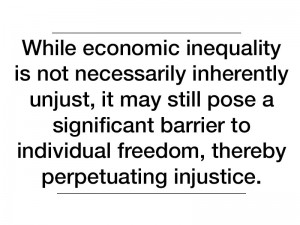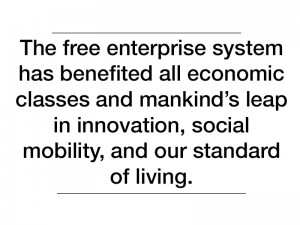While I agree with Joe Gilligan’s point that free market capitalism has benefitted society through encouraging innovation and thereby increasing the wealth and living standards for societies as a whole, it is not immediately apparent whether these accomplishments classify capitalism as good and just. The statistic that Americans have a higher median income and standard of living than Swedes merely demonstrates that free market capitalism, as compared to socialism, may be a more effective route to materialist ends. In order to take the next step and assert that capitalism is then good, one would need to assume that maximal wealth is the good to be pursued by an economic system. However, this would be to assume what capitalism already asserts: that the ultimate goal is maximization of profit. In order to avoid circular reasoning, the goodness of capitalism cannot be analyzed on the basis of resulting wealth. Fulfillment of materialist objectives, such as the effective production of goods and the increase of societal wealth, is a significant merit for an economic system, but does not provide adequate basis for qualifying capitalism as good and just. The standards of what is good and just for an economic system should be defined in ethical rather than purely economic terms.
The traditional ethical defense of capitalism is on the basis of freedom. According to Amartya Sen in Development as Freedom, while efficiency and the ability to improve living standards are important reasons to maintain free markets, “the more immediate case for the freedom of market transaction lies in the basic importance of that freedom itself.” Though we might dispute how freedom should be defined or realized, most of us probably agree that freedom is intrinsically valuable, and the promotion of freedom is an acceptable basis for asserting that free market capitalism is “good.”
The issue to be explored, then, is to what extent the theoretical good of free market capitalism—freedom—is actually realized in capitalist societies. In this context, the attainment of individual freedom will also be my criteria for measuring whether the system is just.
Perhaps the issue of greatest concern for individual freedom in capitalist societies is immense (and growing) wealth and income disparity. The Gini coefficient, which measures the income inequality within a particular group, has risen enormously within countries with capitalist systems over the past quarter-century. Since China began capitalist market reforms in 1979, its baseline standard of living has increased considerably, but its Gini coefficient has increased from about 28 points (marking relatively equal economic distribution) in 1991 to over 47 points (marking gross inequality) in 2012.
 While economic inequality is not necessarily inherently unjust, it may still pose a significant barrier to individual freedom, thereby perpetuating injustice. Individuals with less money have less freedom to act in various areas of life, for instance to access education or healthcare. Individuals with less money also have less power to influence what happens in society. This is particularly true in circumstances where wealth may literally buy political influence, a common occurrence in countries such as China. To the extent that the gross economic inequality associated with capitalism limits freedom, it is unjust.
While economic inequality is not necessarily inherently unjust, it may still pose a significant barrier to individual freedom, thereby perpetuating injustice. Individuals with less money have less freedom to act in various areas of life, for instance to access education or healthcare. Individuals with less money also have less power to influence what happens in society. This is particularly true in circumstances where wealth may literally buy political influence, a common occurrence in countries such as China. To the extent that the gross economic inequality associated with capitalism limits freedom, it is unjust.
Defenders of capitalism might respond by suggesting that the underlying structure of capitalism is just, however, because it rewards individual effort and achievement with economic success. But basing economic justice solely on individual effort mistakenly assumes that individuals begin on level playing fields with equal capabilities to succeed. A recent World Bank study showed that 80% of variability in a person’s income is accounted for by country of birth and parental income level. The remaining 20% is primarily affected by sex, race, and other variables over which persons have no control; individual effort has a very small impact on economic success. Even in capitalist societies where there might be a stronger relationship between effort and success than exists globally, there is no question that factors over which an individual has no control significantly influence his or her life success or lack thereof, economic and otherwise. Although capitalism is structured individualistically, in reality, the “individuals” who take part in capitalism are shaped by communities.
So am I suggesting that free market capitalism is not good and just? Perhaps this is not the most relevant question. When evaluating capitalism, we must consider it in relation to alternate economic systems. Other systems might come closer to the ideal of the good and the just in some regards, but there are always tradeoffs. While free market capitalism cannot be unqualifiedly characterized as good and just, it may still be the best alternative. However, we must be careful to recognize the limitations of capitalism so that we can be open to pursuit of the good and just through whatever measures may be most effective rather than limiting ourselves to a single framework.

